2018高考英语高考英语专项听力模拟训练二——时间(when)
2018高考英语单句语法填空专项2
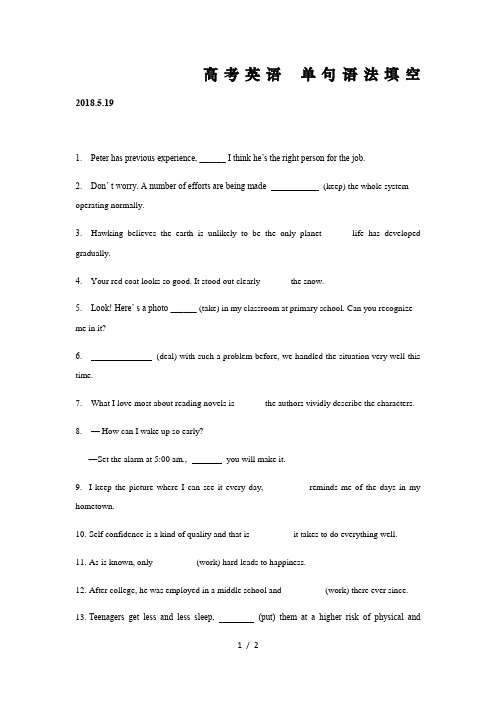
高考英语单句语法填空2018.5.191. Peter has previous experience, ______ I think he’s the right person for the job.2. Don’ t worry. A number of efforts are being made (keep) the whole system operating normally.3. Hawking believes the earth is unlikely to be the only planet _____ life has developed gradually.4. Your red coat looks so good. It stood out clearly ______ the snow.5. Look! Here’ s a photo ______ (take) in my classroom at primary school. Can you recognize me in it?6. (deal) with such a problem before, we handled the situation very well this time.7. What I love most about reading novels is ______ the authors vividly describe the characters.8. — How can I wake up so early?—Set the alarm at 5:00 am., you will make it.9.I keep the picture where I can see it every day, _________ reminds me of the days in my hometown.10.Self confidence is a kind of quality and that is _________ it takes to do everything well.11.As is known, only _________ (work) hard leads to happiness.12.After college, he was employed in a middle school and _________ (work) there ever since.13.Teenagers get less and less sleep, (put) them at a higher risk of physical andmental health problems.14.—Thank you for reminding me of the time,otherwise I (be) late yesterday—Don’t mention it.15.It’s important for a girl to know what colors look good her skin.16.Travel Frog(create) by a Japanese game studio has become a hit in China.17.Beijing plans to build its first bicycle lane connects a residential area with a business center【参考答案】1.so2.to keep3.where4.against5.taken6.Having dealt with7.how8.and9.which 10.what11.working 12.has worked 13.putting 14.would have been 15.against 16.created 17.which。
高考英语听力模拟训练 1-6习题部分

英语听力模拟训练1第一节听力理解(共15小题;每小题2分,满分30分)每段播放两遍。
各段后有几个小题,各段播放前每小题有5秒钟的阅题时间。
请根据各段播放内容及其相关小题,在5秒钟内从题中所给的A、B、C项中,选出最佳选项。
听第一段对话,回答1~2题。
1.Where does this conversation most probably take place?A.At a party.B.In an office.C.In the woman’s house.2.Why is the man feeling down?A.He doesn’t know anybody except the woman.B.He is all by himself at Christmas.C.He doesn’t like Christmas.听第二段对话,回答3~5题。
3.How does the man get the information about homeless population?A.From an article.B.From TV.C.From radio.4.How many homeless people are there in India?A.1 million.B.2 million.C.3 million.5.Which country has the highest percentage of homeless people?A.France.B.The US.C.Germany.听第三段对话,回答6~9题。
6.What is the man doing?A.Questioning about an evening school.B.Asking about reading habits.C.Exchanging reading experience with the woman.7.How much time does the woman spend a week reading newspapers?A.About two or three hours.B.About four or five hours.C.About seven or eight hours.8.What does the woman like best?A.Newspapers.B.Textbooks.C.Novels.9.What does the woman read now?A.Textbooks.B.Novels.C.New York Times.听第四段对话,回答10~12题。
2018年广东省高考英语听说模拟考试题2
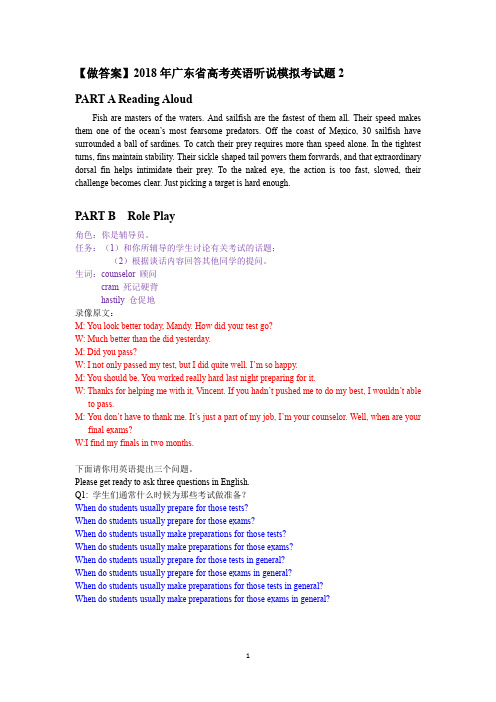
【做答案】2018年广东省高考英语听说模拟考试题2PART A Reading AloudFish are masters of the waters. And sailfish are the fastest of them all. Their speed makes them one of the ocean’s most fearsome predators. Off the coast of Mexico, 30 sailfish have surrounded a ball of sardines. To catch their prey requires more than speed alone. In the tightest turns, fins maintain stability. Their sickle-shaped tail powers them forwards, and that extraordinary dorsal fin helps intimidate their prey. To the naked eye, the action is too fast, slowed, their challenge becomes clear. Just picking a target is hard enough.PART B Role Play角色:你是辅导员。
任务:(1)和你所辅导的学生讨论有关考试的话题;(2)根据谈话内容回答其他同学的提问。
生词:counselor 顾问cram 死记硬背hastily 仓促地录像原文:M: You look better today, Mandy. How did your test go?W: Much better than the did yesterday.M: Did you pass?W: I not only passed my test, but I did quite well. I’m so happy.M: You should be. You worked really hard last night preparing for it.W: Thanks for helping me with it, Vincent. If you hadn’t pushed me to do my best, I wouldn’t able to pass.M: You don’t have to thank me. It’s just a part of my job, I’m your counselor. Well, when are your final exams?W:I find my finals in two months.下面请你用英语提出三个问题。
最新精品高考英语专项听力模拟训练二——时间(when)
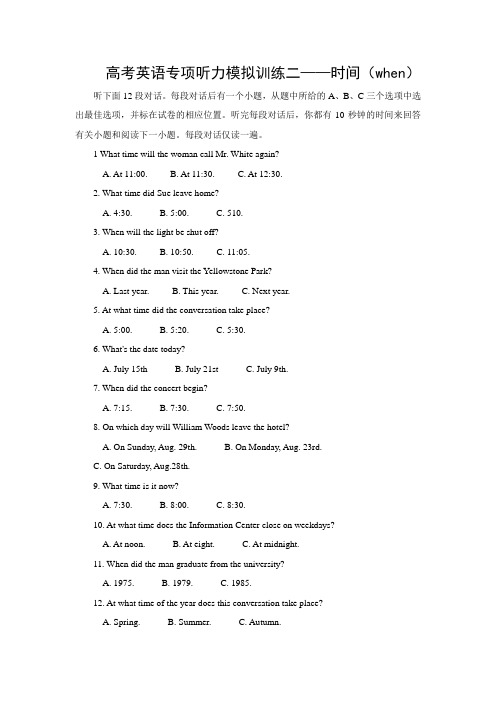
高考英语专项听力模拟训练二——时间(when)听下面12段对话。
每段对话后有一个小题,从题中所给的A、B、C三个选项中选出最佳选项,并标在试卷的相应位置。
听完每段对话后,你都有10秒钟的时间来回答有关小题和阅读下一小题。
每段对话仅读一遍。
1 What time will the woman call Mr. White again?A. At 11:00.B. At 11:30.C. At 12:30.2. What time did Sue leave home?A. 4:30.B. 5:00.C. 510.3. When will the light be shut off?A. 10:30.B. 10:50.C. 11:05.4. When did the man visit the Yellowstone Park?A. Last year.B. This year.C. Next year.5. At what time did the conversation take place?A. 5:00.B. 5:20.C. 5:30.6. What's the date today?A. July 15thB. July 21stC. July 9th.7. When did the concert begin?A. 7:15.B. 7:30.C. 7:50.8. On which day will William Woods leave the hotel?A. On Sunday, Aug. 29th.B. On Monday, Aug. 23rd.C. On Saturday, Aug.28th.9. What time is it now?A. 7:30.B. 8:00.C. 8:30.10. At what time does the Information Center close on weekdays?A. At noon.B. At eight.C. At midnight.11. When did the man graduate from the university?A. 1975.B. 1979.C. 1985.12. At what time of the year does this conversation take place?A. Spring.B. Summer.C. Autumn.答案:BACAB ABABA BA。
2018年贵州省高考英语第二次模拟演练试题与答案

2018年贵州省高考英语第二次模拟演练试题与答案(本试卷满分150分,考试时间120分钟)。
第一部分听力(共两节,满分30分)(略)第二部分阅读理解(共两节,满分40分)第一节(共15小题;每小题2分,满分30分)阅读下列短文,从每题所给的四个选项(A、B、C和D)中,选出最佳选项。
A"Shoeless" children are more likely to get to school earlier. leave later and read more. according to a new research by Bournemouth University.According to The Telegraph .researchers have observed tens of thousands of children who leave their shoes outside the classroom and found that pupils are more engaged in their lessons. which in turn leads to better academic performance. The research is in line with policies introduced in schools in England where children who go to class shoeless -following the steps of schools in Scandinavia in an effort to improve their academic standards and behavior.The study is based on observing and studying tens of thousands of children in over 100 schools in around 25 countries over the last ten years. For decades children in northern Europe have learned with their shoes off because they are left at the school door arrival due to snow.ice or mud.And now academics are calling on teachers in England to apply similar "shoeless" policies to give children the best possible chance of performing in their exams. Experts believe having children with no shoes in the classroom improves their learning because it makes them "feel at home" and more relaxed when learning.Professor Stephen Heppell. who leads the research at Bournemouth University, said: "Children are much more willing to sit on the floor and relax if they have no shoes on. The last place a child would sit to read is an upright chair and we've foundthat 95 percent of them actually don't read on a chair at home. When they go on holidays they read lying down. Having conditions in the classroom that are like those at home means that more boys are reading in the classroom. Children also arrive earlier and leave later. which translates into half an hour of extra learning a day on average.”Wearing no shoes also means the cleaning bill decreased by 27 percent and schools need tospend less money on furniture because they don't need to buy a chair and a table for every child as they can sit on the 21. In the classroom. shoeless kids were found to be more_.A. absent-mindedB. politeC. focusedD. restless22. What can we conclude from Professor Heppell's words in Paragraph 5?A. Children learn faster in an upright sitting position.B. Classrooms should have their conditions improved.C. Habits formed at an early age are rarely changed.D. Children naturally prefer to read in a relaxed position.23. Why do children in northern Europe go to class shoeless?A. They have to he barefoot for their family conditions.B. They follow the customs front their ancestors.C. They feel more comfortable without shoesD. They have to leave the muddy shoes outside the classrooms.24. What could he the best title for the text?A. Policies help schools cut down on spendingB. Shoeless children do better at schoolC. "Shoeless" policies benefit kids in England$来&源:D. Good behavior pays off in the endBI was talking with a friend not long ago who mentioned he was taking his childrento Paris for the summer vacation, and the only thing I could think of was how grateful I was that my father never did that for me. Our vacations were spent 50 miles south of our home in Indiana, at Lane’s Camping Retreat.The campground had two lakes: one for fishing, the other for swimming. The swimming lake had a diving board about 300 feet high, and every year some kid made his way to the end of the board and then froze with fear. We’d run to the camp store and fetch Mr. Lane, who would walk down to the lake and yell at the kid to jump. But he never would. So Mr. Lane would climb the ladder, throw the kid over his shoulder, and climb back down.One year, our dad bought a tractor inner tube, which amazed us---we had begged him for years for something to float on, and he had resisted, saying it would cause wild excitement and we would drown. Then, unexpectedly, he bought the tube, which lasted several minutes before it broke and sank while my brother was on it. He would have drowned, except he was five feet tall and the water was only three feet deep, so he just stood up and walked to shore.After supper, we would sleep with the tent windows rolled up and Dad telling ghost stories. The raccoons(浣熊)would come out from the woods and move around the campfire, eating the spilled(散落的)pie filling.“What’s that?” Dad would ask. “Someone’s out there. Can you hear them?”We would pull our sleeping bags over our heads and dream of serial killers, then awaken to the sound of birdsong.Though I have never been to Paris, I can’t for the life of me consider myself deprived(被剥夺的).25. What happened when the author’s brother floated on the water?A. He fell into the lake.B. He was hurt by the tube.C. He ran wild for several minutes.D. He drowned due to the excitement.26. How did the author feel about his friend’s summer trip?A. It was tiring.B. It was boring.C. It was costly.D. It was admirable.27. Why did Mr. Lane come to the swimming lake?A. To punish the naughty kid.B. To guarantee the kid’s safety.C. To teach the kids swimming skills.D. To help the kids overcome their fear of diving.28. For what reason did the kids pull their sleeping bags over their heads?A. They wanted to drive the raccoons away.B. They were frightened.C. They found the campfire unbearable.D. They felt very coldCProsocial behaviors are those intended to help other people. Behaviors that can be described as prosocial include feeling empathy(同感) and concern for others and behaving in ways to help or benefit other people.Prosocial behavior has long posed a challenge to social scientists seeking to understand why people engage in helping behaviors that are beneficial to others, but costly to the individual performing the action. Why would people do something that benefits someone else but offers no immediate benefit to the doer?Psychologists suggest that there are a number of reasons why people engage in prosocial behavior. In many cases, such behaviors are fostered during childhood and adolescence as adults encourage children to share, act kindly, and help others. Prosocial behaviors are often seen as being compelled by a number of factors including egoistic reasons (doing things to improve one's self-image), reciprocal benefits (doing something nice for someone so that they may one day return the favor), and more altruistic reasons (performing actions purely out of empathy for another individual).Characteristics of the situation can also have a powerful impact on whether or not people engage in prosocial actions. The bystander effect is one of the most notableexamples of how the situation can impact helping behaviors. The bystander effect refers to the tendency for people to become less likely to assist a person in distress when there are a number of other people also present. For example, if you drop your purse and several items fall out on the ground, the likelihood that someone will stop and help you decreases if there are many other people present. This same sort of thing can happen in cases where someone is in serious danger, such as when someone is involved in a car accident. In some cases, witnesses might assume that since there are so many other people present, someone else will have surely already called for help.Why do people help in some situations but not in others? Experts have discovered a number of different situational variables that contribute to (and sometimes interfere with) prosocial behaviors. First, the more people that are present decreases the amount of personal responsibility people feel in a situation. People also tend to look to others for how to respond in such situations, particularly if the event contains some level of ambiguity. Fear of being judged by other members of the group also plays a role. People sometimes fear leaping to assistance, only to discover that their help was unwanted or unwarranted. In order to avoid being judged by other bystanders, people simply take no action.Experts have suggested that some key things must happen in order for a person to take action.29. Which situation can be described as the bystander effect?A. When hearing an injured lady crying for help, the neighbors didn’t take action.B. On the scene of your colleague’s traffic accide nt, you called the police for helpC. A woman was to give birth on the train and you were the only doctor there.D. Seeing an old man slipping on the icy road, many people volunteered to help.30. What does the underlined word “distress” in the fourth par agraph mean?A. comfortB. despairC. peaceD. trouble31. Prosocial behaviors are motivated for all the following reasons EXCEPT________.A. the desire to better one’s self-imageB. instant benefits of helping othersC. parental influences in the early lifeD. empathy for another individual32. After the last paragraph, the most possible topic could be ________.A. situational influences on prosocial behaviorB. various reasons for prosocial behaviorC. possible benefits of prosocial behaviorD. skills and knowledge to provide assistanceDIn many countries, schools have long summer holidays, with shorter holidays in between. However, a new report suggests shortening school holidays to stop children forgetting what they have learnt during the long summer break. Instead of three school terms, it says, there should be five eight-week terms. And there should be just four weeks off in the summer, with a two-week break between the other terms.Sonia Montero has two children at primary school and works full-time. She supports the idea. “The kids,” she says, “have much longer holidays than me and I can’t afford to take several weeks off work, so I need someone to take care of them. But nobody wants the work in the summer months — they all have holidays of their own.”Not surprisingly, some young people disagree. Student Jason Panos says “It’s a stupid idea. I would hate staying at school in the summer. It’s unfair, too. The people who suggest this had long school holidays when they were young, but now they want to stop us enjoying the summer. The kids in Spain and America have much longer holidays than here, but they don’t forget everything they’ve learnt in a few months.”Nadia Salib agrees. “Sure,” she says, “the first week at school after the s ummer is never easy, but you soon get back into it. The real problem round here is that kids get bored after so many weeks out of school, and then some of them start causing trouble. But the answer is to give them something to do, not make everyone stay in school longer.”33. What does Nadia say about young people on summer holidays?A. They need something to do to enrich themselves.B. Long holidays are very bad for their education.C. They would like to spend more time at school.D. Long holidays should be shortened to stop them causing trouble.34. What does Jason say about long summer holidays?A. These days many older people have them too.B. Schools in other countries don’t have them.C. They can help children forget about school. D. T hey have little influence on children’s education.35. Why is Sonia in support of shorter school holidays?A. .She can’t afford to pay someone to look after her children.B. She is worried that her children will forget what they’ve learnt.C. She doesn’t get any summer holidays in her jobD. She can’t get anyone to look after her children in summer.第二节(共5小题;每小题2分,满分10分)根据短文内容,从短文后的选项中选出能填入空白处的最佳选项。
2018年高考英语试题卷II(解析)

2018年(全国卷II)英语真题知识点1.finalised: 定下来,定稿(1)单词拓展:final(adi.): 最后的,最终的;finally(adv.): 最后,终于= in the end, at last (2)动词后缀:①“ize”, “ise”: 做成,变成,使...化。
例:modernize, mechanize, organize②“en”: 使变成,引起。
例:quicken, weaken, soften, harden.2.canoeing [kəˈnu:ɪŋ] : 皮划艇运动;划独木舟,玩独木舟3.Dartmoor [ˈdɑ:tmuə]:(英国Devon 郡的)达特姆尔高原4.Belgium ['beldʒəm]: 比利时比利时王国简称比利时,位于欧洲西部沿海,东与德国接壤,北与荷兰比邻,南与法国交界,东南与卢森堡毗连,西临北海与英国隔海相望。
海岸线长66.5公里。
全国面积2/3为丘陵和平坦低地,全境分为西北部沿海佛兰德伦平原、中部丘陵、东南部阿登高原三部分,最高点海拔694米,主要河流有马斯河和埃斯考河,属海洋温带阔叶林气候,四季明显。
比利时无论是地理上还是文化上,比利时都处于欧洲的十字路口。
被誉为"西欧的十字路口"。
国土面积虽不大,但各具特色的旅游景点遍布全国。
首都布鲁塞尔不仅有闻名于世的滑铁卢古战场,也是众多国际机构的驻地。
比利时属海洋温带阔叶林气候,四季明显。
旅游时间以春秋两季为佳。
比利时是一个高度发达的资本主义国家,经济高度对外依赖,外贸为其经济命脉,为世界十大商品进出口国之一,全国GDP的大约三分之二来自出口。
为世界高度工业发达国家之一,是19世纪初欧洲大陆最早进行工业革命的国家之一。
比利时拥有完善的港口、运河、铁路以及公路等基础设施,为与邻国更紧密的经济整和创造条件,也是欧盟和北约创始会员国之一,还是联合国、世界贸易组织等国际组织的成员国。
2018届高考英语冲刺集训2018英语第二套
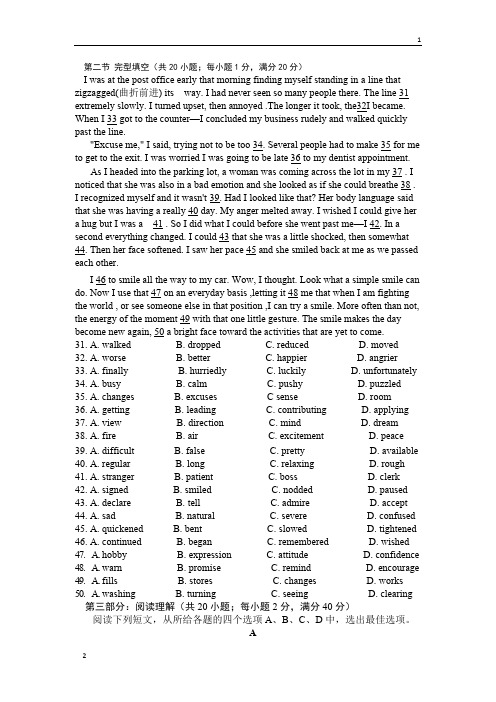
第二节完型填空(共20小题;每小题1分,满分20分)I was at the post office early that morning finding myself standing in a line that zigzagged(曲折前进) its way. I had never seen so many people there. The line 31 extremely slowly. I turned upset, then annoyed .The longer it took, the32I became. When I 33 got to the counter—I concluded my business rudely and walked quickly past the line."Excuse me," I said, trying not to be too 34. Several people had to make 35 for me to get to the exit. I was worried I was going to be late 36 to my dentist appointment.As I headed into the parking lot, a woman was coming across the lot in my 37 . I noticed that she was also in a bad emotion and she looked as if she could breathe 38 .I recognized myself and it wasn't 39. Had I looked like that? Her body language said that she was having a really 40 day. My anger melted away. I wished I could give her a hug but I was a 41 . So I did what I could before she went past me—I 42. In a second everything changed. I could 43 that she was a little shocked, then somewhat 44. Then her face softened. I saw her pace 45 and she smiled back at me as we passed each other.I 46 to smile all the way to my car. Wow, I thought. Look what a simple smile can do. Now I use that 47 on an everyday basis ,letting it 48 me that when I am fighting the world , or see someone else in that position ,I can try a smile. More often than not, the energy of the moment 49 with that one little gesture. The smile makes the day become new again, 50 a bright face toward the activities that are yet to come.31. A. walked B. dropped C. reduced D. moved32. A. worse B. better C. happier D. angrier33. A. finally B. hurriedly C. luckily D. unfortunately34. A. busy B. calm C. pushy D. puzzled35. A. changes B. excuses C sense D. room36. A. getting B. leading C. contributing D. applying37. A. view B. direction C. mind D. dream38. A. fire B. air C. excitement D. peace39. A. difficult B. false C. pretty D. available40. A. regular B. long C. relaxing D. rough41. A. stranger B. patient C. boss D. clerk42. A. signed B. smiled C. nodded D. paused43. A. declare B. tell C. admire D. accept44. A. sad B. natural C. severe D. confused45. A. quickened B. bent C. slowed D. tightened46. A. continued B. began C. remembered D. wished47. A. hobby B. expression C. attitude D. confidence48. A. warn B. promise C. remind D. encourage49. A. fills B. stores C. changes D. works50. A. washing B. turning C. seeing D. clearing第三部分:阅读理解(共20小题;每小题2分,满分40分)阅读下列短文,从所给各题的四个选项A、B、C、D中,选出最佳选项。
2018年普通高等学校招生全国统一考试(课标全国卷Ⅱ) 听力试题及答案
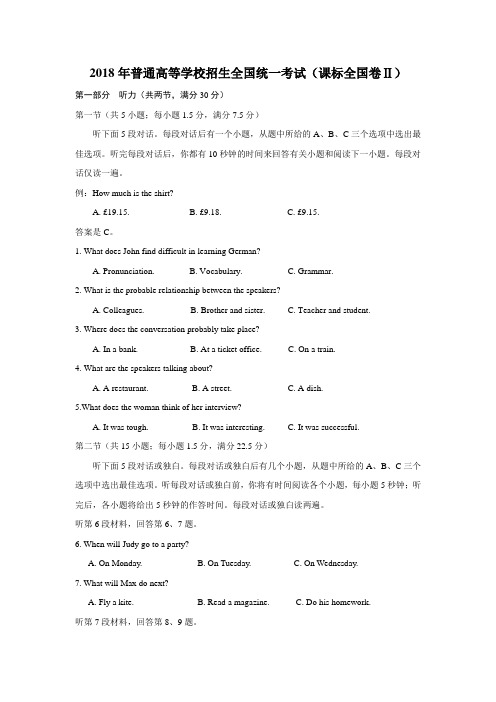
2018年普通高等学校招生全国统一考试(课标全国卷Ⅱ)第一部分听力(共两节,满分30分)第一节(共5小题;每小题1.5分,满分7.5分)听下面5段对话。
每段对话后有一个小题,从题中所给的A、B、C三个选项中选出最佳选项。
听完每段对话后,你都有10秒钟的时间来回答有关小题和阅读下一小题。
每段对话仅读一遍。
例:How much is the shirt?A. £19.15.B. £9.18.C. £9.15.答案是C。
1. What does John find difficult in learning German?A. Pronunciation.B. Vocabulary.C. Grammar.2. What is the probable relationship between the speakers?A. Colleagues.B. Brother and sister.C. Teacher and student.3. Where does the conversation probably take place?A. In a bank.B. At a ticket office.C. On a train.4. What are the speakers talking about?A. A restaurant.B. A street.C. A dish.5.What does the woman think of her interview?A. It was tough.B. It was interesting.C. It was successful.第二节(共15小题;每小题1.5分,满分22.5分)听下面5段对话或独白。
每段对话或独白后有几个小题,从题中所给的A、B、C三个选项中选出最佳选项。
听每段对话或独白前,你将有时间阅读各个小题,每小题5秒钟;听完后,各小题将给出5秒钟的作答时间。
- 1、下载文档前请自行甄别文档内容的完整性,平台不提供额外的编辑、内容补充、找答案等附加服务。
- 2、"仅部分预览"的文档,不可在线预览部分如存在完整性等问题,可反馈申请退款(可完整预览的文档不适用该条件!)。
- 3、如文档侵犯您的权益,请联系客服反馈,我们会尽快为您处理(人工客服工作时间:9:00-18:30)。
高考英语专项听力模拟训练二——时间(when)听下面12段对话。
每段对话后有一个小题,从题中所给的A、B、C三个选项中选出最佳选项,并标在试卷的相应位置。
听完每段对话后,你都有10秒钟的时间来回答有关小题和阅读下一小题。
每段对话仅读一遍。
1 What time will the woman call Mr. White again?
A. At 11:00.
B. At 11:30.
C. At 12:30.
2. What time did Sue leave home?
A. 4:30.
B. 5:00.
C. 510.
3. When will the light be shut off?
A. 10:30.
B. 10:50.
C. 11:05.
4. When did the man visit the Yellowstone Park?
A. Last year.
B. This year.
C. Next year.
5. At what time did the conversation take place?
A. 5:00.
B. 5:20.
C. 5:30.
6. What's the date today?
A. July 15th
B. July 21st
C. July 9th.
7. When did the concert begin?
A. 7:15.
B. 7:30.
C. 7:50.
8. On which day will William Woods leave the hotel?
A. On Sunday, Aug. 29th.
B. On Monday, Aug. 23rd.
C. On Saturday, Aug.28th.
9. What time is it now?
A. 7:30.
B. 8:00.
C. 8:30.
10. At what time does the Information Center close on weekdays?
A. At noon.
B. At eight.
C. At midnight.
11. When did the man graduate from the university?
A. 1975.
B. 1979.
C. 1985.
12. At what time of the year does this conversation take place?
A. Spring.
B. Summer.
C. Autumn.
答案:BACAB ABABA BA。
